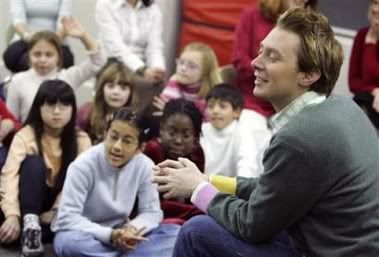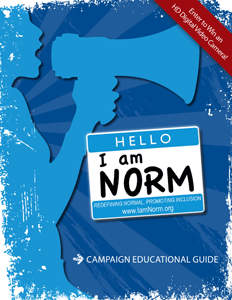 This week is National Inclusive Schools Week; a time to recognize that being inclusive is not about being politically correct. It is about making sure that our educational system works for all students including minorities, students of low socio-economic status, students just learning English, and students with disabilities
This week is National Inclusive Schools Week; a time to recognize that being inclusive is not about being politically correct. It is about making sure that our educational system works for all students including minorities, students of low socio-economic status, students just learning English, and students with disabilities
The 10th Annual Inclusive Schools Week is being celebrated December 6–10, 2010, in classrooms, schools, and communities throughout the world. According to their web page,
Inclusive Schools Week is celebrated annually during the first week in December by families, schools and organizations around the world. The Week highlights and celebrates the progress that schools have made in implementing inclusive practices to ensure a quality education for an increasingly diverse student population.
The Week provides an important opportunity for educators, students, and parents to discuss what else needs to be done in order to ensure that their schools continue to improve their ability to successfully educate all children. It is an occasion to acknowledge the hard work and commitment of teachers, administrators, students, and parents in making their schools more inclusive, and, thereby, significantly contributing to the development of a more inclusive society.
David Riley at the Education Development Center, Inc. is an out-spoken advocate for Inclusion in all schools. He studied the schools in Massachusetts and used some of their practices to describe some of the things all schools should be doing.
- Every school should have an inclusion facilitator, trained in moderate and severe disabilities that works with classroom teachers and aides to provide full access to the curriculum for all students.
- In grades 2–12, students with language-based learning disabilities should be in the general classroom staffed with both a general and special education teacher, resulting in significant academic gains for these students.
- Schools should offer a variety of opportunities for all children to succeed.
- Discussion, hands-on learning, and inquiry-based projects are examples of inclusive teaching.
- Communities surrounding the schools should embrace the principles of inclusion among their citizens.
 News stories appear daily about the state of our schools and their failure to meet the needs of our children. The nation’s education agenda is a constant source of debate usually focused on how to best educate students, what they should be learning and when, and how we will know if they’ve learned it. But in at least one area, our schools and classrooms have made progress and can be shown to be doing remarkably well: we are now including more children in the nation’s academic agenda than ever before.
News stories appear daily about the state of our schools and their failure to meet the needs of our children. The nation’s education agenda is a constant source of debate usually focused on how to best educate students, what they should be learning and when, and how we will know if they’ve learned it. But in at least one area, our schools and classrooms have made progress and can be shown to be doing remarkably well: we are now including more children in the nation’s academic agenda than ever before.
Many see positive changes in every-day events. Riley reports on the English teacher who describes a student with learning disabilities as a kid who writes great stories using that special computer program…. how about the custodian who asks a deaf student to teach him how to sign “have a good day.”
This year’s theme, “Awareness to Action: Celebrating 10 Years of Inclusive Schools Week,” focuses on how schools can move forward in their journey toward excellence by following a path of reflection, planning and action.
 The National Inclusion Project is involved in Inclusive Schools Week. The following is on their web page:
The National Inclusion Project is involved in Inclusive Schools Week. The following is on their web page:
The National Inclusion Project is partnering with other national organizations on a new youth-led national inclusion campaign: I am Norm!
December 6-10 is Inclusive Schools Week and we’ve created a free I am Norm Educational Guide which can be downloaded from the site and used to promote disability rights and inclusion this month and beyond.
The campaign is giving away 2 free HD video cameras to the best I am Norm videos submitted. One will go to an individual and one to a class/club. Details are on the website.
Congratulations to The National Inclusion Project for helping to support this wonderful week for all students. I would imagine that Clay Aiken, Diane Bubel, Aron Hall, Kristy Barnes and the rest of the staff of the National Inclusion Project feel excited to be a part of this remarkable program.


